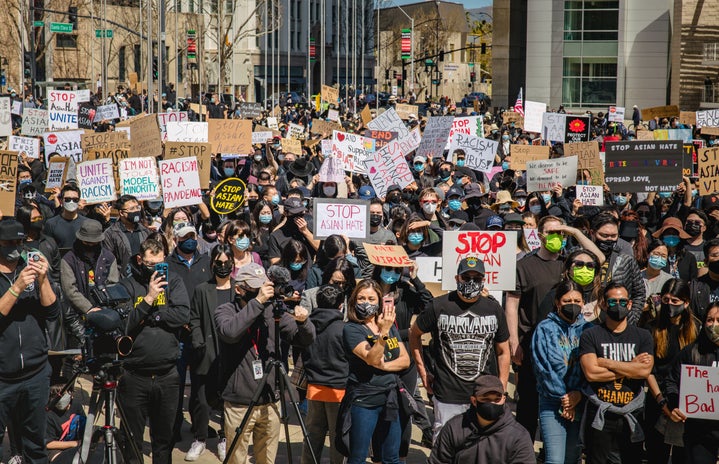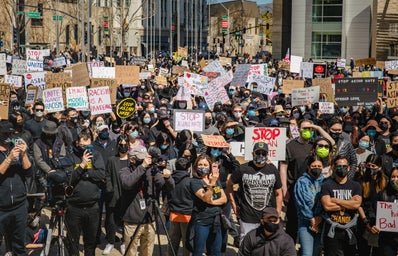Asian American representation is not where it needs to be. Not only are AAPI individuals underrepresented and stereotyped in the media, but they are mistreated and profiled heavily in real life which has led to tragic incidents such as the Atlanta Shooting where six Asian women were killed and the Indianapolis shooting where four Sikhs were killed.
Asian Americans and Pacific Islanders in the United States have not only needed our support now but have needed support in the past. With decades of media degradation and stereotyping, it’s important to now look forward and give the appropriate recognition and representation they have always deserved — this starts with following inspiring and accomplished AAPI influencers and content creators.
- Nadya Okamoto
-
Okamoto, the 23-year old Harvard Student, the 23-year old published author, the 23-year old founder of a non-profit, as well as the 23-year old listed in — get this — Forbes 30 under 30, Bloomberg’s 50 “Ones to Watch” AND People Magazine’s Women Changing the World. Oh, and did I mention this woman is 23?
Her debut book Period Power: A Manifesto for the Menstrual talks about extinguishing the taboo surrounding periods and end explain the stigma surrounding a woman’s period.
In addition to being an author, Okamoto also serves as a speaker who advocates for menstrual justice. “This phenomenon where women’s feelings are being dismissed and minimized is what we in the menstrual movement— as we like to call to call it— that’s what we call the trust gap,” said Okamoto at an event about period stigmatization.
More information about Okamoto and the amazing work she has done can be found on her website.
- Sophia Li
-
Sophia Li is the ultimate media professional not to mention an avid environmentalist. Li wears many hats — a few being former Entertainment Media Editor at Vogue.com, current freelance journalist, board member for environmental non-profit Slow Factory, and director for a short documentary that talks about the biggest landfill in the United States.
She’s also an active advocate against Asian-American racism. In an essay for British Vogue, she wrote, “This is the outrageous and infuriating reality that a lot of Asians living in western societies have had to minimize the notion that there are ‘more important things going on.” She follows with, “But Vincent Chin, Christian Hall, Ryo Oyamada and Ee Lee are among a long line of Asian people killed over the years. Say their names — and don’t say ‘we can’t pronounce their names’ as an excuse not to.”
Power is definitely Li’s strong suit; those words gave me chills as I was reading them. Her words also hold a lot of unfortunate truths about western society which is what also makes them powerful. Li doesn’t hold back and her writing should inspire you to not hold back either while talking about race and prejudice.
To view and read more of Li’s work, visit her website.
- Amanda Nguyen
-
Nobel Peace Prize Nominee Amanda Nguyen is known for her civil rights advocacy and activism. She passed 33 laws protecting 85 million sexual assault survivors with the help of a theory she coined “Hopeanomics.”
Nguyen is also a CEO and founder of Rise, an organization throough which she teaches grassroots organizing, a skill that many who want to make a change need in their repertoire.
Her social justice work does not come without proper recognition. Nguyen is a Heinz Laureate, Nelson Mandela Changemaker, Forbes 30 Under 30, Foreign Policy 100, Time 100 Next, Frederick Douglass 100, and Marie Claire Young Woman of the Year.
She also served under the Obama Administration at both NASA and the state department. Oh, and not to mention that this seriously impressive woman is a Harvard graduate.
To learn more about Nguyen, visit her website.
- Sara Li
-
Sara Li’s written work is nothing short of fantastic, and is definitely worth a read. Her words can be seen in Cosmopolitan, Fashionista, Refinery 29, NYLON, Teen Vogue, and more.
Her attention towards Asian-American racism amid the Coronavirus pandemic started early. In March 2020, a political essay she wrote for Teen Vogue’s website detailed the spread of Chinese-American racism.
“The racist reception of COVID-19 isn’t surprising, or even unprecedented. It feeds into long-held stereotypes about Asian Americans and other ethnic groups,” she said. “As far back as the late 19th century, public health officials in the U.S. were describing Chinese Americans as disease-ridden and dirty.”
Her writing is honest and employs a sincere tone, a tone that’s important to use when talking about racism, especially racism that’s been experienced personally.
To read more of her work, visit her website.
- Seema Hari
-
Seema Hari’s presence on Instagram gives me a rush of serotonin, to say the least. Their posts shed awareness of colorism in the South Asian community. Being a darker-skinned Indian-American myself, the awareness on issues surrounding colorism is incredibly important to me and many other South Asian women who experience dysphoria around their skin color.
They also post about political injustices that are occurring in India. As an Indian-American, I will admit that I’m not as versed in Indian politics as I should be, so following influencers like Hari has proven extremely helpful in addition to following Indian news sources.
In a profile written about Hari in Seema (fitting for Hari, considering this publication is their namesake), Akanksha Singh writes, “This (back)story belongs to Seema Hari, a dark-skinned Indian anti-colorism activist. But it’s not her backstory that’s really of interest here. Rather, what happens in the after.”
The article details Hari’s struggle with skin color growing up and how they were given tubes of lightening cream and were told that they were a burden because of their skin color.
“‘It took a long time to repair the wounds I had,’ says Hari. But repair them she did. Today, she is a DJ, a singer, a filmmaker, a photographer, and a developer for Snapchat. Most prominently, with her dark skin, long black hair, enviable cheekbones, and disarming smile – a model,” Singh writes in Hari’s profile.
Hari’s career as a model speaks as an inspiration to all individuals with dark skin who were told that their skin color is a disadvantage. Them being a model also speaks to the crazies that told them that they are anything less than gorgeous — one look at their Instagram feed and you’ll get what I mean.
Follow Seema on Twitter and Instagram to learn more and hear more from this powerhouse of a person.
- Simrah Farrukh
-
As a Pakistani-American, Simrah Farrukh hopes to shed light on South-Asian American art and fashion (a sector of art and fashion that does not get nearly as much recognition as it should get in my opinion).
Her website describes her as a “photographer exploring dreams, realities + utopias primarily of brown women,” and her work has shown up within The New York Times, Adobe, and Beats by Dre.
In a feature in Vice, journalist Meera Navlakha talks about Farrukh’s work and how she spotlights South Asian identity in her work. “My work has always been based on women’s empowerment. In the past, I focused on colorism and domestic violence. A lot of my work is regarding women,” Farrukh said.
Many of her photographs evidently capture the beauty and essence of South Asian women. In one photo story, she photographed a South Asian woman and her two daughters, all of whom are wearing traditional attire. The description that goes with the photostory said, “To be and to have a daughter is to hold an unexplainable kind of love. It isn’t easy being a brown woman. There are expectations, pressures, desires placed on us from birth. The relationship between a mother and a daughter is the space where we learn + unlearn these challenges.”
Her work is raw and elegant and definitely worth looking at. To view more of Farrukh’s work, visit her website.
- ALOK
-
Alok Vaid-Menon who goes by ALOK is a writer, speaker, and performer and in my opinion, a fashion icon. ALOK is the author of both Femme in Public and Beyond the Gender Binary, both books explore gender-non conformity, self-acceptance, and unapologetic expression.
They have also been honored with numerous accolades such as being a part of NBC’s Pride 50, Out Magazine’s OUT 100, and Business Insider’s 25 Doers. They also design clothes, clothes that break gendered barriers and are vibrant with prints and unique shapes.
ALOK strives to speak for those who have rarely been spoken to, they speak for those who need to be reminded that they are fabulous.
In a speech given in at the Business of Fashion Voices Summit in 2019, ALOK beautifully explains their gender identity.
“When people ask me if I’m a boy or a girl I usually respond, ‘No.’ But what I can tell you is that my five o’clock shadow is a built-in contour and my bountiful body hair is a testament to the fact that I am so fabulous that my body found a way to accessorize itself.”
To delve more into ALOK’S work visit their website.
These individuals are true examples of brilliant and accomplished Asian Americans. They seek to bring light to what they are passionate about by introducing others to the true beauty of the Asian American community. They seek to influence and enlighten many — and that includes you.


